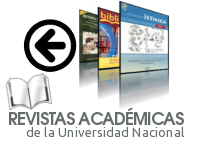UNA’s ecosystemic and dialogic praxis
DOI:
https://doi.org/10.15359/udre.11-1.9Keywords:
agricultural practices, education, participatory approach, pesticide, socio-critical approachAbstract
Costa Rica has intensified vegetable production by implementing monocultures managed with technological packages (synthetic fertilizers and pesticides). This model has sustained production in Zarcero, a municipality that supplies fresh vegetables to Costa Rica’s capital and surroundings. However, investigations developed by the Regional Institute for Studies on Toxic Substances (IRET) have revealed concerning information on pesticide use regime in the area and associated adverse effects on the environment and health of inhabitants. In response to this problem, IRET, the School of Agricultural Sciences, and the Division of Rural Education launched a project in 2018. The project’s primary aim was “to promote an alternative model for agricultural production through collaborative work, social sharing and construction of knowledge, in order to reduce the use of agrochemicals in Zarcero, Alajuela.” The project included activities developed by academic groups, farmers and their families, and school children. The academic groups worked to carry out the following activities: a) a theoretical-political framework of common reference; b) an interdisciplinary perspective to design work strategies based on analysis to transform actual situations; and c) good collaborative relationships, and from there to pool goals. Achieving these activities needed executing other ones: a) study circles; b) fieldwork; c) knowledge exchange processes at the national and international level; d) the production of educational written materials for farmers; and e) articulation of the previous activities with teaching, research, and production activities. In addition, agroecology has been positioned in the institutional, local, regional, and national political agendas and in some international territories. From the academic work produced in the project, we have learned to be and do “Necessary University” since public universities need to legitimize themselves in the country. Therefore, we proposed to regain the trust of farmers and their families by creating spaces for rapprochement to contextualize and reflect on agricultural problems jointly, revitalize local knowledge, obtain inputs for the writing of educational documents with a socio-critical approach from popular education. As a result, it has been possible to “sow” the idea of change in some farmers; spaces for exchange between local farmers and farmers from other municipalities have been created. Small children are a driving force for change in homes; so, we have actively worked with them guided by critical pedagogy and carrying out collaborative school-family-community work. Moreover, it has been possible to politicize the national events, re-signifying the farmer’s knowledge and diversifying the learning scenarios. In conclusion, we consider that academic work linked to real situations enables improvement processes in the productive agricultural life of the communities and enriches teaching, research, extension, and writing in the public university. All these activities stimulate the social sharing of knowledge that links local knowledge to the academic one generated in universities, promotes unlearning of the traditional manner of “building university,” and contributes to reflection anchored to the biocentric approach. The present work provides ideas for the construction of a university extension policy. It contributes to developing a work process to understand better the link that university life should have with the daily needs of communities and the processes of improving farming-socio-community life.
References
Caldera, Y., Fernández, M. y Guevara, C. (2016). La academia sensible: experiencias y encuentro de saberes en la universidad venezolana. Telos, 18(1),4-16. https://www.redalyc.org/jatsRepo/993/99344833002/html/index.html
Carta a la comunidad universitaria. (2018). Congreso Universitario: Transformando la Docencia en la UNA. Vicerrectoría de Docencia, Universidad Nacional. Heredia, Costa Rica. 31 p.
Casado, A. E., Ruiz, L. y López, C. C. (2015). Ecologías de saberes dentro de la universidad: propuestas de intervención para liberar dispositivos docentes. Profesorado, 19(2), 25-40.
Dussel, E. (2001). Hacia una filosofía política crítica. España: Editorial Desclée.
Estatuto Orgánico de la Universidad Nacional. (2015). Heredia, Costa Rica. 114 p.
Foucault, M. (1970). Saber y verdad. España: Las Ediciones de la Piqueta.
Larrosa, J. (2003). La experiencia y sus lenguajes. Seminario Internacional “La Formación Docente entre el Siglo XIX y el Siglo XXI”. Buenos Aires, Argentina.
Maffesoli, M. (2004). El tiempo de las tribus. México: Siglo XXI Editores.
Martínez, B. J. (2001). Arqueología del concepto “compromiso social” en el discurso pedagógico y de formación docente. Revista Electrónica de Investigación Educativa, 3(1). http://redie.uabc.mx/vol3no1/contenido-bonafe.html
Pesticide Action Network International (PAN). (2016). Lista de plaguicidas altamente peligrosos de PAN Internacional. https://rap-al.org/wp-content/uploads/2017/09/HHP-Lista-PAN-2016-actual-traducida-espa%C3%B1ol_29agosto17.pdf
Roldan, C. (2012). Lineamientos para la planeación del turismo sostenible en el corregimiento de San Francisco de Asís (Municipio de Acandí, Chocó, Colombia). Revista Gestión y Ambiente, 15(1), 129-142. https://revistas.unal.edu.co/index.php/gestion/article/view/30827/30935
Santaella, R. E. (2014). Pedagogía crítica, una propuesta educativa para la transformación social. Reidocrea, 3, 147-171. file:///C:/Users/50686/Downloads/ReiDoCrea-Vol.3-Art.21-Santaella.pdf
Servicio Fitosanitario del Estado. (2016). Sistema de insumos y fiscalización. http://app.sfe.go.cr/SFEInsumos/aspx/Pantallas/PantallaSeleccion.aspx
Téllez, M. (2001). La paradójica comunidad por-venir. En J. Larrosa y Skliar, Habitantes de Babel. Políticas y poéticas de la diferencia. España: Editorial Laertes.
Published
How to Cite
Issue
Section
License

La Revista y cada uno de los artículos que se publican están licenciados por Creative Commons Atribución No comercial Sin derivadas 4.0 Internacional.


